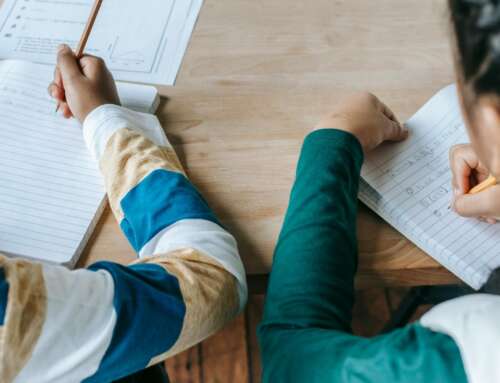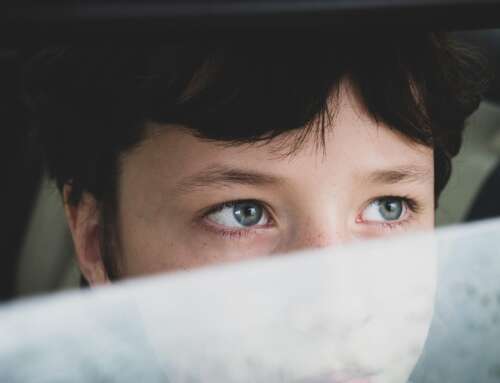 The teen years are often fraught with door-slamming, eye-rolling and seeming insensitivity, even by kids who behaved kindly before. Some parents worry that they’re doing something wrong, or that their children will never think of anyone but themselves. New research shows that biology, not parenting, is to blame. In adolescence, critical social skills that are needed to feel concern for other people and understand how they think are undergoing major changes. Adolescence has long been known as prime time for developing cognitive skills for self-control, or executive function. “Cognitive empathy,” or the mental ability to take others’ perspective, begins rising steadily in girls at age 13, according to a six-year study published recently in Developmental Psychology. But boys don’t begin until age 15 to show gains in perspective-taking, which helps in problem-solving and avoiding conflict.
The teen years are often fraught with door-slamming, eye-rolling and seeming insensitivity, even by kids who behaved kindly before. Some parents worry that they’re doing something wrong, or that their children will never think of anyone but themselves. New research shows that biology, not parenting, is to blame. In adolescence, critical social skills that are needed to feel concern for other people and understand how they think are undergoing major changes. Adolescence has long been known as prime time for developing cognitive skills for self-control, or executive function. “Cognitive empathy,” or the mental ability to take others’ perspective, begins rising steadily in girls at age 13, according to a six-year study published recently in Developmental Psychology. But boys don’t begin until age 15 to show gains in perspective-taking, which helps in problem-solving and avoiding conflict.
Adolescent males actually show a temporary decline, between ages 13 and 16, in a related skill—affective empathy, or the ability to recognize and respond to others’ feelings, according to the study, co-authored by Jolien van der Graaff, a doctoral candidate in the Research Centre Adolescent Development at Utrecht University in the Netherlands. Fortunately, the boys’ sensitivity recovers in the late teens. Girls’ affective empathy remains relatively high and stable through adolescence.
The riptides are often noticeable to parents. Susan Burkinshaw has tried to cultivate empathy in her two teenage sons, 16 and 18, since they were toddlers, encouraging them to think about others’ feelings. Yet one “went through a period in eighth grade where he was just a bear to deal with. He always had an attitude,” says Ms. Burkinshaw, of Germantown, Md. “Then as quickly as it came on, it turned back off again.”
The findings reflect a major expansion in researchers’ understanding of cognitive growth during adolescence, according to a 2012 research review co-authored by Ronald Dahl, a professor of public health at the University of California at Berkeley. Researchers used to believe that both forms of empathy were fully formed during childhood.
Now, it’s clear that “the brain regions that support social cognition, which helps us understand and interact with others successfully, continue to change dramatically” in the teens, says Jennifer Pfeifer, an assistant professor of psychology at the University of Oregon in Eugene. Preliminary research in her lab also suggests cognitive empathy rises in teens. The discoveries serve as a new lens for exploring such teen behaviors as bullying and drug abuse.
Kids who develop affective and cognitive empathy form healthy relationships and argue less with their parents, research shows. Perspective-taking continues to be central for adults on the job, helping in designing and selling products and services, building user-friendly devices, and working smoothly with others with diverse viewpoints and backgrounds.
Affective empathy is grounded in the limbic region of the brain, which regulates emotions. This capacity begins developing in infancy when parents respond sensitively to babies’ emotions. Children learn to practice empathy by watching their parents and by experiencing it themselves—being treated well by adults who respond warmly to their feelings, says Anthony Wolf, a Longmeadow, Mass., psychologist, author and speaker.
Cognitive empathy arises from a different part of the brain, the medial prefrontal cortex, which continues developing later, through adolescence. But the two are linked; children’s affective empathy predicts their level of cognitive empathy as teens, says a forthcoming study by Caspar Van Lissa, a doctoral candidate at Utrecht’s adolescent-research center.
Parents can help instill affective empathy by encouraging children to walk in others’ shoes. If Ms. Burkinshaw’s kids saw a child being teased or treated badly, she asked them, “If that had been you, what would you have wanted your friends to do to help?”
Her 12-year-old daughter Alexandra recently told her that several classmates had hurt another girl’s feelings by blocking her from following them on Instagram. “I said, ‘What could you do to help her?’ ” Ms. Burkinshaw says. Alexandra talked with her friends, and another mother also intervened. The girls apologized and invited the victim back into the group.
Adolescents’ brains work particularly hard on perspective-taking; teens make heavier use than adults of the medial prefrontal cortex, says Sarah-Jayne Blakemore, a professor of cognitive neuroscience at University College London. That may be because understanding others’ viewpoints takes more conscious effort for teens, while it becomes automatic for adults, Dr. Blakemore says. Perspective-taking continues to develop through age 21.
The decline in affective empathy among young teenage boys may spring at least partly from a spurt during puberty in testosterone, sparking a desire for dominance and power, says the study in Developmental Psychology. Boys who were more mature physically showed less empathy than others.
Boys also feel pressure from peers and some adults to “act like a man,” which they often define as being detached, tough, funny and strong, says Rosalind Wiseman, Boulder, Colo., author of “Masterminds and Wingmen,” a new book about teen boys. They may suppress feelings of empathy so they can join in joking and teasing with peers, she says. “Humor is the social glue among boys, and empathy would be a brake on what they can and cannot joke about.” So some kids “stop listening to their gut.”
Also, some teens may appear insensitive because they’re actually struggling to avoid being overwhelmed by their own feelings of empathy, says Brad Sachs, Columbia, Md., a psychologist, author and speaker. “Teens who seem aloof, hard-hearted or unkind may in reality be quite the opposite.”
Fathers seem to play a special role. Teens whose fathers are supportive, who say they feel better after talking over their worries with their dads, are more skilled at perspective-taking, says a 2011 study of 15- to 18-year-old boys in Developmental Psychology.
Yu Oen of Princeton Junction, N.J., encourages his sons Grant, 19, and Sean, 15, to take others’ perspective by discussing current events with them—including how the people involved must have felt. After the Boston Marathon bombing, they talked about how a runner who lost her legs must have felt when entering a restaurant where everyone else was wearing shorts.
“You can see their reaction: ‘Wow, that is really tough,’ ” Mr. Oen says. “They feel it: ‘What if that had been me?’ ” Mr. Oen and his wife Shirley “feel it too,” he says. “And we take time to talk about these things.”
via Teenagers Are Still Developing Empathy Skills – WSJ.com.







thank you ,these are very interesting theories .I was wondering about the Empathy gene ,as my 16 y.o daughter is horrendous ,rude ,selfish lazy & often abusive to me .Her father has a BPD ( borderline personality disorder ,and she is showing signs,although her therapist says I can’t make a diagnosis yet …help ,when will I know ? CC.
Society today is extremely difficult for young people and for all of us. The guidance they receive from their parents is a watered down set of ethics, integrity, understanding of trust/respect and the core heart felt feelings demonstrated to whose close to them (if there are feelings there at all) – a mish mash of behviours with inconsistent and confused messages. Saying one thing and only acting it out on the surface doesn’t cut the mustard, because what is practiced in ones own personal lives is important but is it genuine. It it’s not important what is?
What is sacred??. The work place is a good example, the behaviour encountered baffles me littered with lies, deception, defence mechanisms, uncaring and superficial. Adults in my view are struggling with what is real to them in the fantacy land they live. The worst being the virtual reality through cyber communication, texts and emails – an avoidance and fear from personal interaction and intimacy. This journey amidst ones need for comfort in materialism, status, power and control completely debases a human being into a subhuman/mutant. I believe we all need to look deeply within and reflect honestly, firstly, whether the BASIC values and qualities we ‘think’ we possess are there – strip it down to the BASICS and see what our personality’s are made up of – Who are we fooling? Question the difference between reality we live in and the ‘concept’ of it. Ask your friends who know you well to give an honest opinion of how they really see you, if you dare/if they dare!!! The harsh social machine grinding away, hits us all hard, it’s the dark devil. Sensitive people are vulnerable and often don’t know how to protect themselves, perceived as foolish and weak by the hardened hearts desensitised cyber personalities. Let us take responsibility for getting rid of the decaying and destructive mental clutter in ones head to prevent us from passing it onto others as useless information, wasting their time and using our creative abilities to construct progressive solutions to the very obvious problems that face us and not be defeated in the face of confusion which appears to prevail. Take the responsibility to ‘CLEANSE’ our attention – a simple excercise is to see what one can remember (try something important and close to your heart – about someone else that you are not prompted to remember by anyone else) from the beginning of the day to the end – take the responsibility for and to follow through our thought processes, correct them, and continue to make amendments where needed – if you can – can you, will you even try!!! If not it’s a far cry for help (lessness), several layers removed from our real selves, far from the important values that make us human, most importantly our hearts and emotions. If we don’t have these attributes or capabilities then how can we expect our children to have them and to passt them onto their children.
Thanks for this insight. I have a 13 yr old boy and am struggling as a single mum.
I recognize so many of my own teenage tendencies in these words. But more… as a teenage single mother, I returned to adult education and qualified as a social worker.
During this time, my son was aged 4-8 years old, and went through much of it with me. What a gorgeous polite & kind child people would tell me.
I went on to work in prisons, were I counseled numerous young men who had gone off the rails during their teenage years for a lack of parental interest or male role models
My own son seemed to revert at the age of 14, and was at risk of delinquency. I was so thankful for my husband, his step-father, who always took a fair, but firm hand, for saving my sanity, and our family.
And then, my son ‘came good’. He is now a responsible family man, married to a lovely girl, with 3 beautiful children, of whom I am very proud.
Thank you; I am now an adult educator, and am researching a new program aimed at parents, teenagers in particular. This will be information that I will share in the beginning sessions.